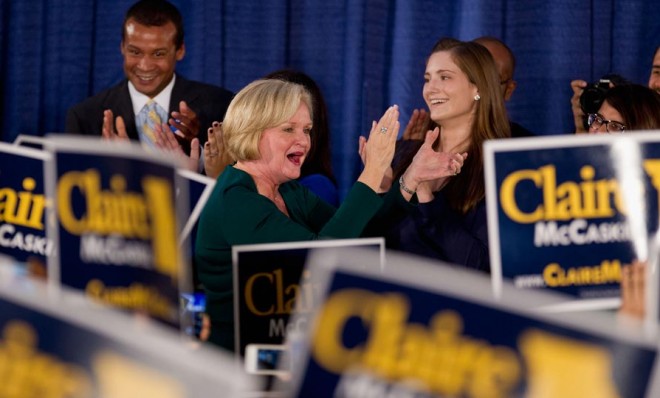If Congress is so unpopular, why do lawmakers keep getting re-elected?
Gallup attempts to answer the age-old paradox


A free daily email with the biggest news stories of the day – and the best features from TheWeek.com
You are now subscribed
Your newsletter sign-up was successful
As polls have consistently shown, Americans aren't big fans of Congress. Yet whenever elections roll around, voters rarely replace their representatives with fresh faces.
Last year, 90 percent of House incumbents won re-election, according to OpenSecrets, despite polls pegging Congress' approval rating at around 20 percent heading into Election Day. In 2004, voters sent fully 98 percent of incumbents back to Washington even though a majority said they disapproved of Congress' job performance.
A Gallup poll released Thursday sheds some light on this seemingly paradoxical phenomenon. It found that, while Americans strongly dislike Congress as a whole, they generally like their own representatives.
The Week
Escape your echo chamber. Get the facts behind the news, plus analysis from multiple perspectives.

Sign up for The Week's Free Newsletters
From our morning news briefing to a weekly Good News Newsletter, get the best of The Week delivered directly to your inbox.
From our morning news briefing to a weekly Good News Newsletter, get the best of The Week delivered directly to your inbox.
In the survey, just 16 percent of respondents said they approved of the job Congress is doing, versus 79 percent who said the opposite. That's in line with other recent polls that have found Americans pretty down on Congress. Two April surveys from CBS/New York Times and Fox News both pegged Congress' approval rating at a meager 17 percent.
At the same time though, Gallup found that a 46 percent plurality of Americans approve of the job the representatives from their districts are doing, versus 41 percent who said they disapproved. Digging deeper, Gallup found that individual lawmakers got higher marks if respondents could first name them and their party affiliation. Of those who knew both name and party, 62 percent said they approved of their representative, while 32 percent said they did not.
So what's causing this divergence?
Here's Gallup with some possible explanations:
A free daily email with the biggest news stories of the day – and the best features from TheWeek.com
Paradoxically, many Americans actually approve of the job their own district's congressional representative is doing. And those who say they know the name of their representative are even more likely to be positive about that individual's work. This may involve basically nonlegislative ways representatives benefit their districts, such as helping their constituents deal with the federal bureaucracy or bringing federal money back to the district to fund projects that benefit the local economy. Also, in an era when district borders are often drawn specifically to benefit one of the parties, many representatives are likely to be politically in tune with their districts.
Thus, when thinking about Congress as a whole, Americans are nearly as sour as they have ever been, but when they think just about their own representative, they feel much better about the job that person is doing. [Gallup]
That helps explain why incumbents do so well, even when Congress as a whole is less popular than, say, cockroaches or Nickelback.
Jon Terbush is an associate editor at TheWeek.com covering politics, sports, and other things he finds interesting. He has previously written for Talking Points Memo, Raw Story, and Business Insider.
-
 Properties of the week: pretty thatched cottages
Properties of the week: pretty thatched cottagesThe Week Recommends Featuring homes in West Sussex, Dorset and Suffolk
-
 The week’s best photos
The week’s best photosIn Pictures An explosive meal, a carnival of joy, and more
-
 The ‘ravenous’ demand for Cornish minerals
The ‘ravenous’ demand for Cornish mineralsUnder the Radar Growing need for critical minerals to power tech has intensified ‘appetite’ for lithium, which could be a ‘huge boon’ for local economy
-
 The billionaires’ wealth tax: a catastrophe for California?
The billionaires’ wealth tax: a catastrophe for California?Talking Point Peter Thiel and Larry Page preparing to change state residency
-
 Bari Weiss’ ‘60 Minutes’ scandal is about more than one report
Bari Weiss’ ‘60 Minutes’ scandal is about more than one reportIN THE SPOTLIGHT By blocking an approved segment on a controversial prison holding US deportees in El Salvador, the editor-in-chief of CBS News has become the main story
-
 Has Zohran Mamdani shown the Democrats how to win again?
Has Zohran Mamdani shown the Democrats how to win again?Today’s Big Question New York City mayoral election touted as victory for left-wing populists but moderate centrist wins elsewhere present more complex path for Democratic Party
-
 Millions turn out for anti-Trump ‘No Kings’ rallies
Millions turn out for anti-Trump ‘No Kings’ ralliesSpeed Read An estimated 7 million people participated, 2 million more than at the first ‘No Kings’ protest in June
-
 Ghislaine Maxwell: angling for a Trump pardon
Ghislaine Maxwell: angling for a Trump pardonTalking Point Convicted sex trafficker's testimony could shed new light on president's links to Jeffrey Epstein
-
 The last words and final moments of 40 presidents
The last words and final moments of 40 presidentsThe Explainer Some are eloquent quotes worthy of the holders of the highest office in the nation, and others... aren't
-
 The JFK files: the truth at last?
The JFK files: the truth at last?In The Spotlight More than 64,000 previously classified documents relating the 1963 assassination of John F. Kennedy have been released by the Trump administration
-
 'Seriously, not literally': how should the world take Donald Trump?
'Seriously, not literally': how should the world take Donald Trump?Today's big question White House rhetoric and reality look likely to become increasingly blurred
